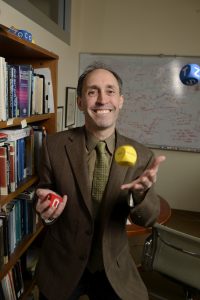Jason Eisner honored by Association for Computational Linguistics
According to the Association for Computational Linguistics, the primary international scientific and professional society for scholars focused on computational problems involving human language, its Fellows are recognized for “contributions to the field [that] have been most extraordinary in terms of scientific and technical excellence, service to the association and the community, and/or educational or outreach activities with broader impact.”
Considering the criteria, it’s difficult to find a more deserving recipient than Jason Eisner, a professor in the Department of Computer Science and a member of the Center for Language and Speech Processing, who was just given this honor.
Eisner’s body of work combines natural language processing (NLP) and machine learning. Several algorithms and formal methods for structured prediction that he designed have become common practice in NLP.
“It’s amazing that humans can think, and even more amazing that we all learn to exchange sequences of arbitrary symbols as a way to share our thoughts with one another,” Eisner said. “As someone who likes deep puzzles, I really want to get a grasp on how this could possibly work. Building AI systems is a way of testing out my ideas of how it might be done.”
Beyond his intellectual contributions, Eisner is the Diversity and Inclusion co-chair for ACL’s next major conference. He is the first to serve in this role for ACL, and is working to ensure that the organization’s events provide a welcoming environment for all.
“Doesn’t everyone who gets excited about ideas want to share that excitement with others?” Eisner asked.
Eisner moved to Johns Hopkins from the University of Rochester in 2001. His research focuses on structured prediction, such as algorithms to help computers sift through the possible sequences of words to find the best translation of a sentence.
“You get interesting computer science problems when you need to predict a complicated output. Instead of two possibilities, your machine learning algorithm might have to choose among 2^1000 possibilities, which is larger than the number of atoms in the universe,” Eisner said. “Wanting to search quickly through that space, either exactly or approximately, leads to a lot of algorithmic challenges.”
According to Eisner, Johns Hopkins’ Center for Language and Speech Processing is “one of the big places to be” in his field.
“It has been really good to share the work of recruiting and educating the best students with this great community of people,” Eisner said.



